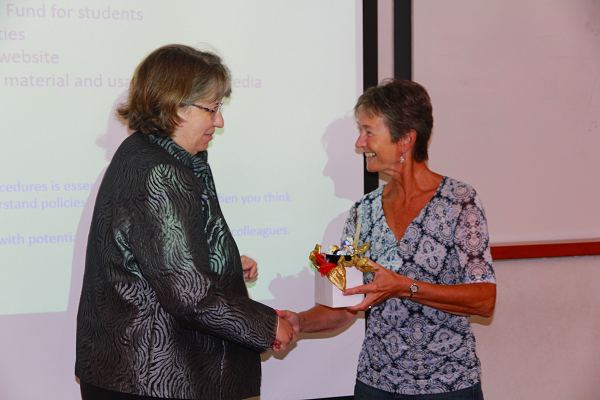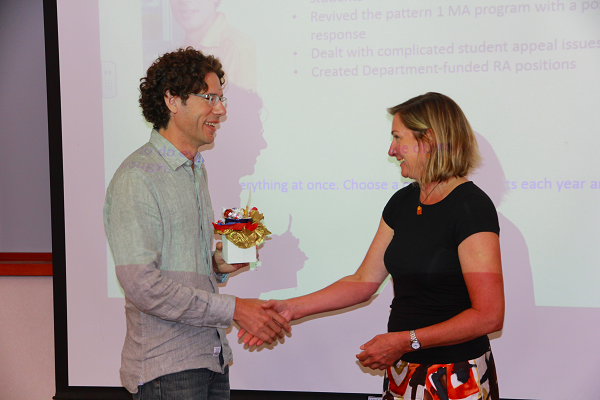Grad coordinators share their tips
September 15, 2017
Share
Strong coordinators play an important role in the success of graduate students, and the School of Graduate Studies as a whole. Enhancing networking within graduate programs, bringing new scholars to study at Queen’s, and supporting graduate students with effective communication, advice, and tools are among some of the responsibilities of graduate coordinators.
Annually, the School of Graduate Studies honours two outstanding coordinators for their contributions through the Featured Graduate Coordinators initiative. The 2017 Featured Graduate Coordinators are Joan Almost, Associate Professor and Associate Director (Graduate Nursing Programs); and Andrew Jainchill, Associate Professor and Graduate Chair (History).
“On behalf of the School of Graduate Studies, congratulations and thanks go to Joan and Andrew for their dedication and passion as educators” says Kim McAuley, Associate Dean of the School of Graduate Studies “Their leadership has helped provide a supportive, positive environment for graduate students at Queen’s”.
Learn more about Dr. Almost and Dr. Jainchill’s approach to graduate coordination, and their advice for new graduate coordinators:

Joan Almost
“During my time as Associate Director (Graduate Nursing Programs), I have focused on enhancing the student experience and fostering a learning community in the graduate nursing programs. Highlights of my activities include the development of initiatives designed to advance networking among students and faculty, maximize recruitment strategies, clarify academic processes, and strengthen our already strong curriculum.
I oversee five programs (including PhD, Master’s and Diploma) across three universities, and collaborate with a consortium of nine universities to deliver our professional Master’s program. One of my biggest learnings when I started this role was remembering all the subtle differences between programs, and understanding policies and procedures at multiple levels within the university. I have truly appreciated the opportunity to learn more about university administration and the chance to work with great colleagues across the university and within the school. I enjoy being part of a team and working with others who play key roles in running the program, especially the program assistants who are invaluable. The experience and knowledge I have learned while in this role has made me a better teacher, advisor and colleague.
I offer the following advice to prospective Graduate Coordinators: first, attention to detail and knowledge of policies and procedures is essential. Know your academic processes, and follow them. Second, ask lots of questions to clarify situations and to understand policies and processes, even when you think you know the answer. And, finally, know that interpersonal aspects of the role are vital, especially with potential applicants, students, and colleagues.”

Andrew Jainchill
“In my two years as grad coordinator, I've focused on maintaining History's already strong program while putting a lot of effort into admissions and recruitment. Credit is due to my predecessors, and to Cathy Dickison, for building a strong program and a strong department culture around admissions and recruitment.
The major initiatives I've undertaken include a departmental grant-writing workshop to support students in their applications for external funding. This is meant to build on the one offered by the School of Graduate Studies. Additionally, we’ve revived the department's pattern I MA – a two-year, thesis-based masters of arts. This has proven to be more popular among students than we anticipated. Third, in conjunction with the department chair, we created department-funded research assistant positions to reward graduate coordinators with particularly heavy supervisory loads.
My advice to new graduate coordinators: first, don't try to do everything at once. Choose a couple of projects each year and see them through. Second, remember that a large part of the grad coordinator's role is facilitating communication. Also acknowledge that being a graduate student is stressful. It's important to be supportive while also remaining clear about what can and can't be done. New coordinators should know that admissions and recruitment takes a ton of work on your part, but your colleagues also have to do their part. Finally, build a strong working relationship with the graduate assistant.”
About Featured Graduate Coordinators
The Featured Graduate Coordinator program is an initiative that began in 2015. The goal is to provide support and encourage best practices, especially for those faculty members new to the role of Graduate Coordinator. Coordinators are selected by the School of Graduate Studies, and the role is administrative. The School asks for their advice and tips for other Graduate Coordinators and shares this advice at its annual Graduate Coordinator Orientation meetings.